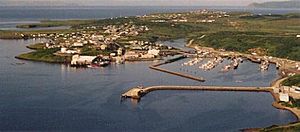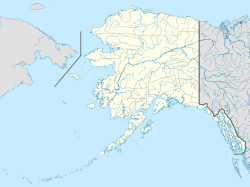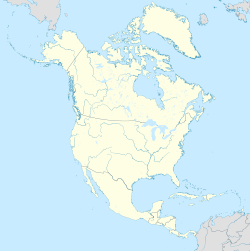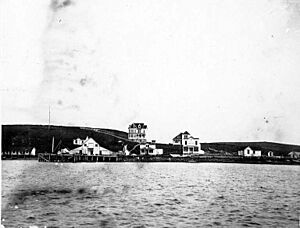Sand Point, Alaska facts for kids
Quick facts for kids
Sand Point
|
|
|---|---|

Sand Point from the air
|
|
| Country | United States |
| State | Alaska |
| Borough | Aleutians East |
| Incorporated | September 1, 1966 |
| Government | |
| • Type | Mayor/Council |
| Area | |
| • Total | 30.29 sq mi (78.46 km2) |
| • Land | 8.01 sq mi (20.75 km2) |
| • Water | 22.28 sq mi (57.71 km2) |
| Elevation | 39 ft (12 m) |
| Population
(2020)
|
|
| • Total | 578 |
| • Density | 72.16/sq mi (27.86/km2) |
| Time zone | UTC-9 (Alaska (AKST)) |
| • Summer (DST) | UTC-8 (AKDT) |
| ZIP code |
99661
|
| Area code | 907 |
| FIPS code | 02-67020 |
| GNIS feature ID | 1419182 |
| Website | sandpointak.com |
Sand Point, also known as Popof Island, is a city in Aleutians East Borough, Alaska, United States. It is located on Popof Island, which is one of the Shumagin Islands. These islands are found off the Alaska Peninsula. Sand Point is the main town, or borough seat, of the Aleutians East Borough. It is also close to the entrance of the Bering Sea.
In 2010, the population of Sand Point was 976 people. By 2020, the number of residents had changed to 578.
The Aleutians East Borough School District covers a large area in Southwestern Alaska. This includes the Alaska Peninsula and the Aleutian Chain. The district was created in 1988. It covers about 38,850 square kilometers (15,000 square miles) of land. This area is mostly tundra, with no roads and few trees.
Contents
History of Sand Point
Sand Point was started in 1898 by a fishing company from San Francisco. It was first used as a place to catch and trade cod fish. Early residents included Aleuts and people from Scandinavia.
For a short time in the early 1900s, gold mining was also important. Today, fishing is still a very big industry. Sand Point has one of the largest fishing fleets in the Aleutian Chain. This means many fishing boats call Sand Point their home port.
What's Sand Point Like?
About half of the people living in Sand Point are of Aleut descent. Most of them belong to the Qagan Tayagungin tribe. They earn a living by fishing and processing fish.
There is a large facility owned by Trident Seafoods that processes and stores fish. Peter Pan Seafoods also has a support building here. Sand Point has an airport with a paved runway that is about 1,585 meters (5,200 feet) long. Daily flights, if the weather is good, connect Sand Point to Anchorage. Anchorage is about 1,065 kilometers (575 nautical miles) to the northeast.
The town is located above the treeline, which means there are no tall trees. There is a small group of about 120 bison on the island. These bison were first brought here in the 1930s. They provide some meat for the people living on the island.
Sand Point is known for its strong winds. These winds happen when cold air from the Bering Sea meets warm air from the Japan Current. The town has a maritime climate, which means it's influenced by the ocean. Temperatures usually range from about -23 to 24 degrees Celsius (-9 to 76 degrees Fahrenheit). On average, it gets about 132 centimeters (52 inches) of snow and 84 centimeters (33 inches) of rain each year.
The Russian Orthodox St. Nicholas Chapel was built in Sand Point in 1933.
People of Sand Point
| Historical population | |||
|---|---|---|---|
| Census | Pop. | %± | |
| 1900 | 16 | — | |
| 1920 | 60 | — | |
| 1930 | 69 | 15.0% | |
| 1940 | 99 | 43.5% | |
| 1950 | 107 | 8.1% | |
| 1960 | 254 | 137.4% | |
| 1970 | 360 | 41.7% | |
| 1980 | 625 | 73.6% | |
| 1990 | 878 | 40.5% | |
| 2000 | 952 | 8.4% | |
| 2010 | 976 | 2.5% | |
| 2020 | 578 | −40.8% | |
| U.S. Decennial Census | |||
Sand Point first appeared in the U.S. Census in 1890. It was officially made a city in 1966. When the Aleutians East Borough was formed in 1987, Sand Point became its government center.
In 2000, there were 952 people living in the city. About 42% of the people were Native American. Also, about 23% were Asian and 27% were White. About 13% of the population was Hispanic or Latino.
The average age of people in the city was 36 years old.
Climate
Sand Point has a cool, wet climate. It is similar to a subpolar oceanic climate. This means it has mild winters and cool summers. It gets less rain than some other parts of the Aleutian Islands.
Culture and Traditions
Sand Point is a community with both Native and non-Native people. More than half of the people who live there permanently are Aleuts, also known as Unangan.
Every July, the town holds a Culture Camp. At this camp, people learn about Aleut traditions. These include:
- Traditional dances
- Sewing Aleut dresses
- Playing drums
- Building kayaks
- Tying knots
- Weaving
The Culture Camp also includes learning the Aleut language.
Geography
Sand Point covers a total area of about 74.9 square kilometers (28.9 square miles). Most of this area, about 54.6 square kilometers (21.1 square miles), is water. The land area is about 20.2 square kilometers (7.8 square miles).
Education
Sand Point has one school called the Sand Point School. It is run by the Aleutians East Borough School District (AEBSD).
The school has about one hundred students. Besides classrooms, the school also has:
- A library
- A gymnasium
- A weight room
- An indoor swimming pool
- A shop class area
Transportation
Getting to and from Sand Point involves flights and boats.
- Ravn Alaska offers flights from Anchorage to Sand Point four days a week. The flight takes about two hours.
- Cargo service is available through Alaska Central Express (ACE) Air Cargo. They fly to Sand Point several times a week.
- Coastal Transportation is a company that provides weekly boat service from Seattle. They deliver goods to communities in the Aleutians, including Sand Point.
During the summer and fall, the Alaska Marine Highway operates the Tustumena ferry. This ferry stops in Sand Point eight times a year. From Sand Point, the ferry travels to other towns like King Cove and Dutch Harbor. The ship can carry cars and trucks.
In Sand Point, you can rent cars from the Harbor Cafe and the Marine View Bed & Breakfast.
Wind Power
In 2012, two large wind turbines were set up in Sand Point. These turbines help to create electricity from the wind. Each turbine can produce 0.5 megawatts of power. Their blades are 19.5 meters (64 feet) across, and the turbines stand 59.5 meters (195 feet) tall.
Fun Activities
There are many fun things to do in Sand Point!
- Many people enjoy hunting for ptarmigan (a type of bird) and bison.
- Commercial and pole fishing are popular hobbies for people living here.
- Boating and riding all-terrain vehicles (ATVs) are also common ways to have fun.
- There is an annual Silver Salmon Derby. In this contest, people try to catch the biggest fish to win a cash prize.
- The Boys and Girls Club offers activities for kids after school.
Fishing Industry
Fishing is the most important part of the local economy in Sand Point. It is home to the largest fishing fleet in the Aleutians.
Trident Seafoods has a big plant here. They process different types of fish like Pacific cod, pollock, salmon, and halibut. They also provide fuel and other services to fishing boats. Peter Pan Seafoods has a facility for storing and moving fish.
To fish for a living, people in Sand Point need to get special commercial fishing permits.
The city improved its main boat harbor, the Robert E. Galovin Small Boat Harbor, in 2014. This harbor can hold more than 150 boats. There is also a new boat harbor nearby.
Shopping and Businesses
The AC Store (Alaska Commercial Company) is a big store in Sand Point. It sells groceries, clothes, ATVs, and toiletries. There are also smaller local stores that sell things like hardware, toys, and electronics.
You can find a few restaurants and a coffee shop in town. There is also a bed and breakfast for visitors.
Media
Radio
- KSDP 830 AM is a local radio station. It is part of NPR and APRN.
See also
 In Spanish: Sand Point (Alaska) para niños
In Spanish: Sand Point (Alaska) para niños




